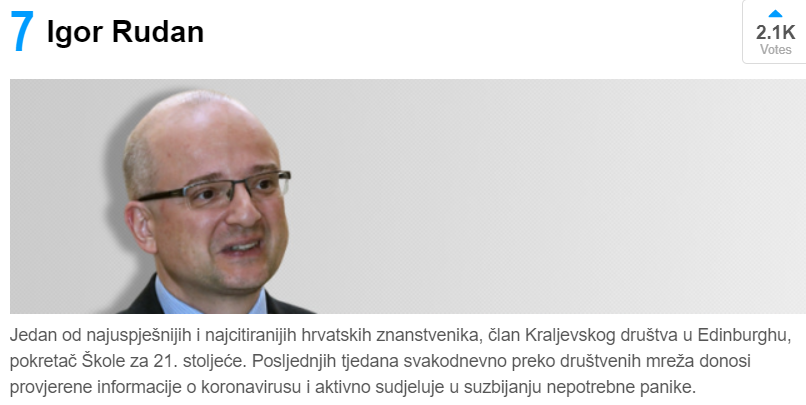No Surge in Coronavirus Cases After Zagreb Earthquake
ZAGREB, March 31, 2020 - Croatia's COVID-19 crisis management team said on Tuesday that there was no surge in the number of coronavirus cases that could be connected with the aftermath of the 22 March strong quake that hit Zagreb and its surroundings, claiming one life and causing extensive damage.
The head of the Croatian Institute of Public Health (HZJZ), Krunoslav Capak, told a news conference that first analyses did not show a higher number of new infections due to the developments in Zagreb on 22 March when larger groups of shocked people fled their buildings to be outside.
Broken down by age, of the total of 867 Croatians diagnosed with COVID-19, as many as 187 are aged between 50 and 59. They are followed by those aged between 40 and 49 (165).
In Croatia, 41 patients diagnosed with COVID-19 are under the age of 20, and 100 are above the age of 70, Capak said.
He informed the news conference that 50 doctors, 10 dentists, 41 nurses, five pharmacists and seven hospital administration staff were among the positive cases.
Also 1,200 employees in the healthcare system are in self-isolation.
More news about the earthquake can be found in the Lifestyle section.
Foreigners Self-Isolating in Croatia: Do You Feel Safer? Mirela from Romania
March 31, 2020 - Do foreigners in Croatia feel more or less safe sitting out COVID-19 here than in their home country, and what are their experiences? A new series on TCN, starting with entrepreneur Mirela Rus from Romania, currently holed up in Split.
Oxford University recently published some research on government responses to coranavirus which showed that Croatia currently has the strictest measures in the world. While inconvenient, this is a good thing in terms of reducing the spread of the virus, and I am certainly not alone in my admiration of the official Croatian handling of this crisis in recent weeks, both in terms of action and communication.
But what do other expats here think? And how does it compare with the response in their home country? Would they rather sit this one out here or there? In the first of a new series on TCN, we will be featuring expats from all over the world to see what their views are on life in corona Croatia rather than back home. We start with our favourite Romanian in Croatia, entrepreneur Mirela Rus in Split, who was happy to share her thoughts.
If you would like to contribute to this series, full details are below. Now, over to the one and only Mirela Rus.
Firstly, how are you? Are you alone/with someone? Tell us a little about your situation and sanity levels.
Luckily, I am with my partner, Ionut (and our three cats), and we are actually used to spending 99% of our time together, we both worked pretty much from the house in the past 10-12 years. So the part about having to stay inside is not the hard one for us. The bonus is that we can sit on our terrace and calm down by looking at the sea in front of us (in the distance, but still, it is a sea view and that is one of the things I am so thankful for right now).
What drives us crazy though (and we are on a rollercoaster of emotions every day, like most, I suppose) is the uncertainty. Is our family going to be OK at the end of this? Are we gonna be OK?
We have two shops in Split, where we sell our own handmade nautical jewellery – a business totally dependent on tourism. We are closed now, and we do not know if we will be able to reopen in June, in August or at all this year. And if we are able to re-open, will Split still have tourists coming? And if we do have tourists coming, will they have enough money to spend on souvenirs anymore, after they themselves being in a crisis? So, basically, will our business survive this? And, if not, how will we be able to support ourselves here, where we have no family to rely on.
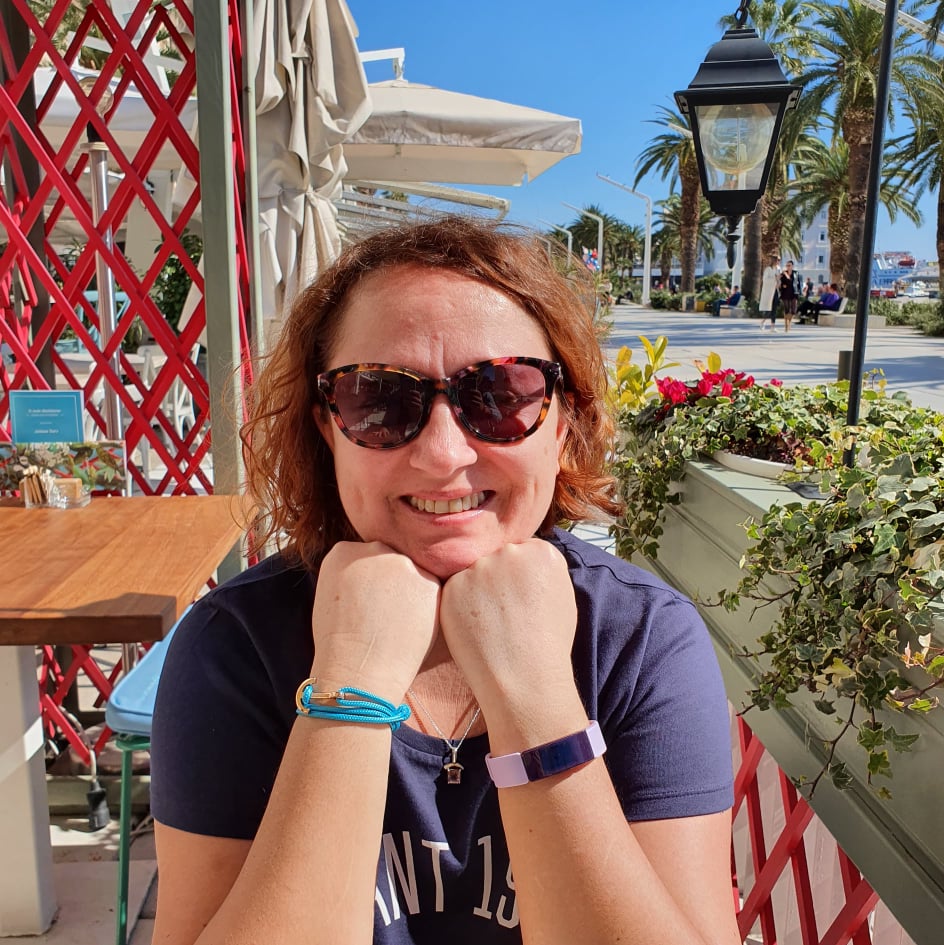
(Last day of freedom in sunny Split)
What do you think about the economic measures the government is taking, are they helping your business?
As a foreigner with not many local ties, finding out how to apply and what the conditions are for the measures that are already starting to be implemented, was the hardest part.
Thank you, actually, for putting me in contact with your TCN colleague Iva Tatic, who helped us apply for the 3250kn per employee (NB, if any other foreigner needs Iva's help, contact This email address is being protected from spambots. You need JavaScript enabled to view it. Subject Iva). We did not get a reply on that yet, and I was also disappointed to see that it does not apply for employees hired after 29.02. I think the date was arbitrary, it should have been the date before they announced the closing of all non-essential businesses. We currently have two employees (besides me and my partner) and we hired them on March 1st, when we reopened our shops (since our business is 100% seasonal) and we could not bring ourselves to fire them, once we had to close the shops. I think it is unfair that we cannot get this aid for them. Since we are willing to keep them on payroll three more months after these 3 months aid is done, I think we should be entitled to receive it.
Like everyone else, I also think the currently announced measures are far from actually helping too much. I would give 10 points to the administration for having the application process for tax deferral online and fast-tracked (we were approved in a day or so). But these taxes will still have to be paid, while we are not sure we will still have a business when this is over. I am hoping the new package Plenkovic announced for this week will be more in the line of what entrepreneurs are asking for. I was happy to see they have mobilized and are asking to have a voice in this. I do believe the economy minister should have already been replaced though.
When did you realise that corona was going to be a big issue?
Pretty early on, since I am used to following world news. I actually just looked at my Facebook post from January. I first got worried on January 14th, when the BBC announced the first case outside China.
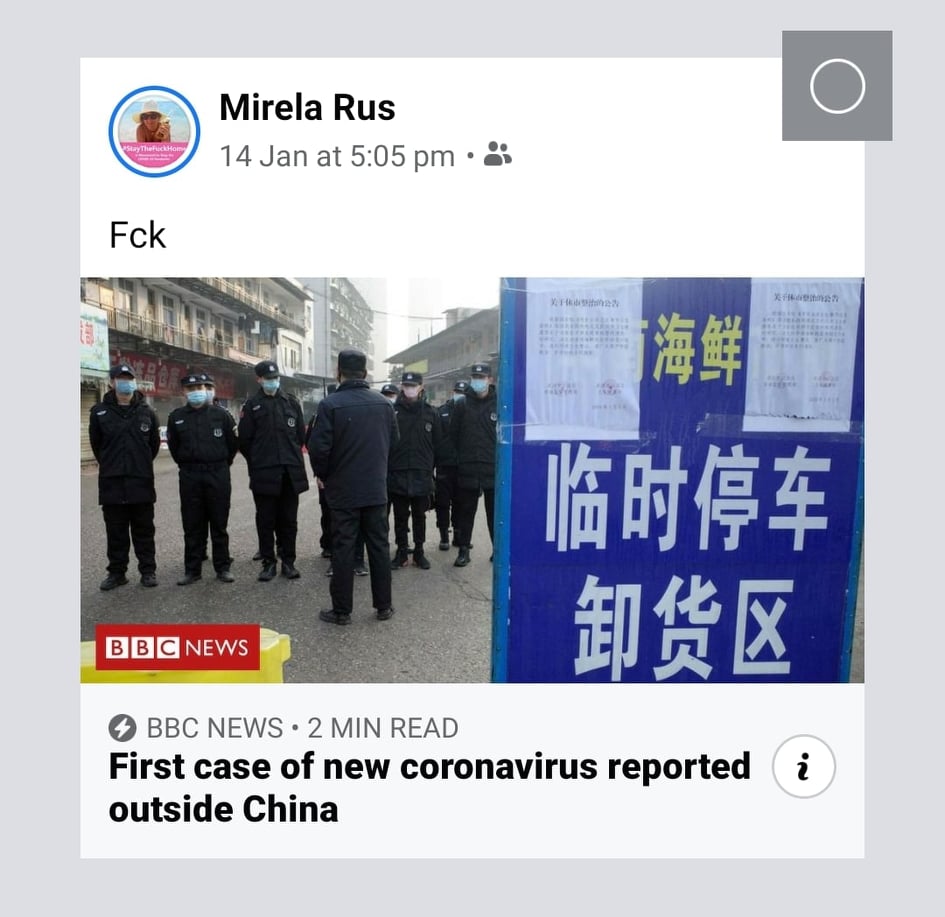
Then really worried and frustrated on January 26th, when a bus full of tourists from Wuhan (!!!) was allowed into Croatia like it was business as usual.
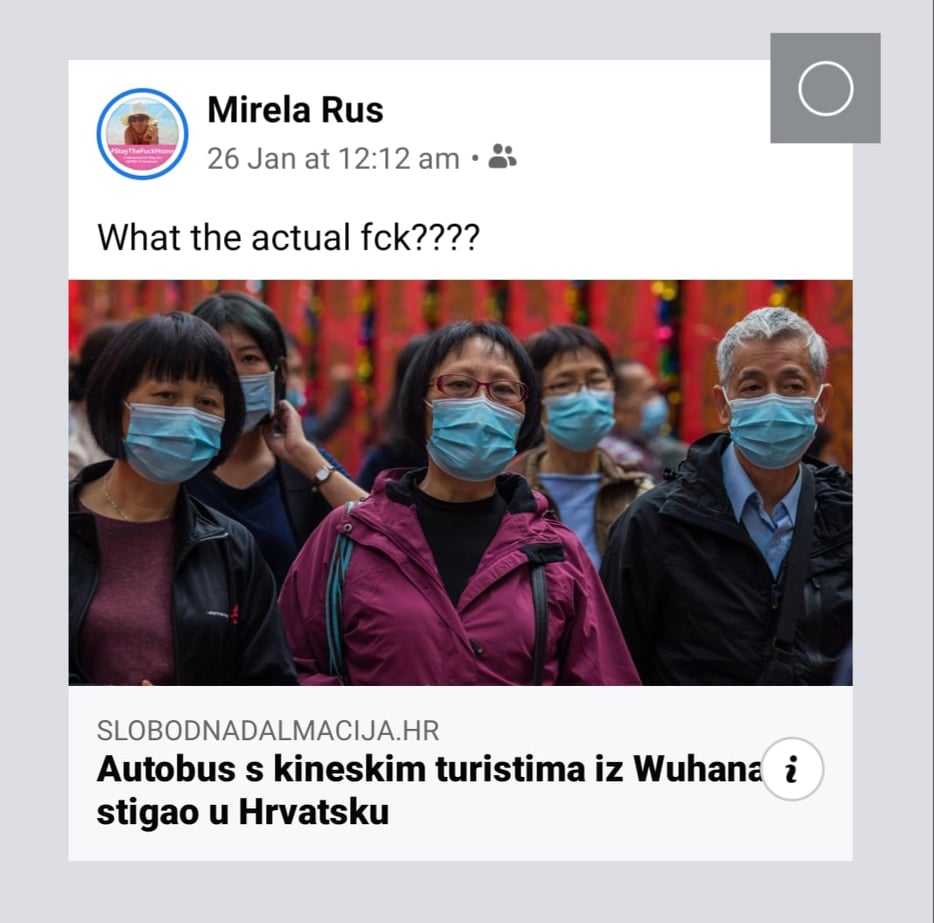
But the first REAL sign that this was not just some casual flu was, for me, on January 29th, when British Airways suspended all flights with China. That was something unprecedented which my former-journalist-mind perceived as confirmation of bad things to come.
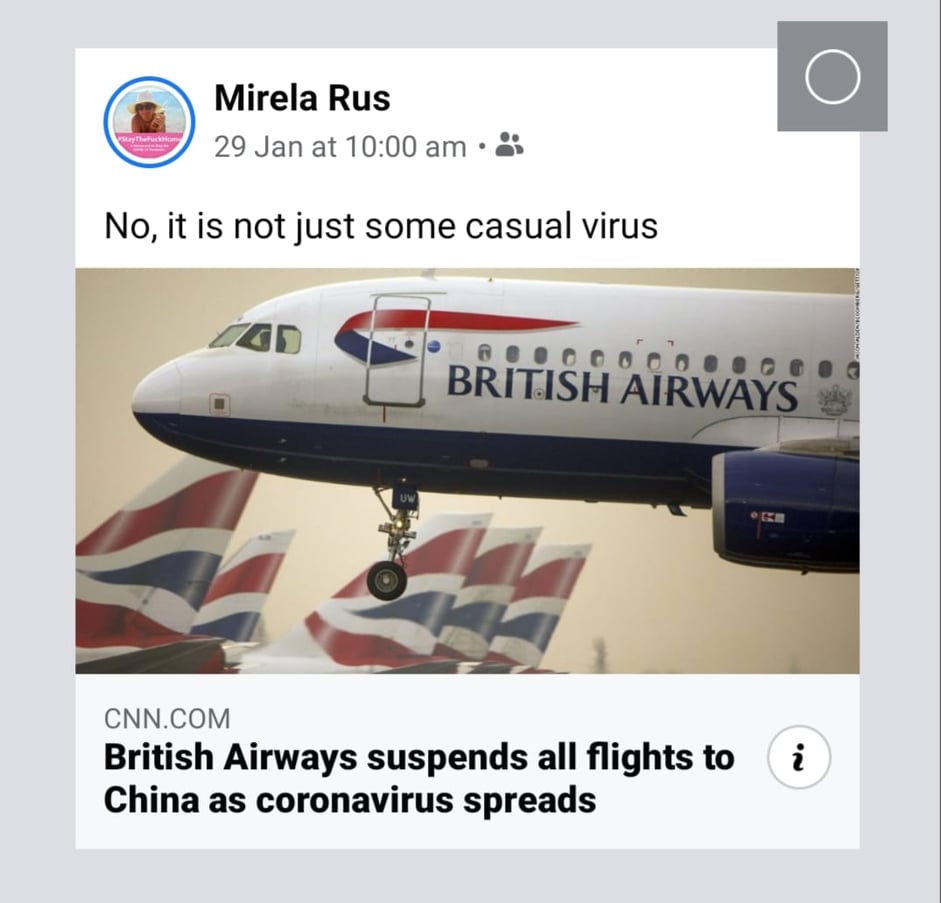
What is your impression of the way Croatia is dealing with the crisis? How safe do you feel?
Well, it all started pretty poorly. No Wuhan tourists bus should have been allowed in the country, but those were early days and I guess nobody wanted to believe this would turn out to be the pandemic scientists were warning us about for years. So – compared to what other countries were doing at the time – I cannot really blame Croatian authorities for not doing more.
But coming back to the present time, I feel safer here than I would feel anywhere else. I am VERY impressed on how authorities are now handling the crisis (and I would happily contribute to having a statue erected for Vili Beros and Alemka Markotic when this is over).
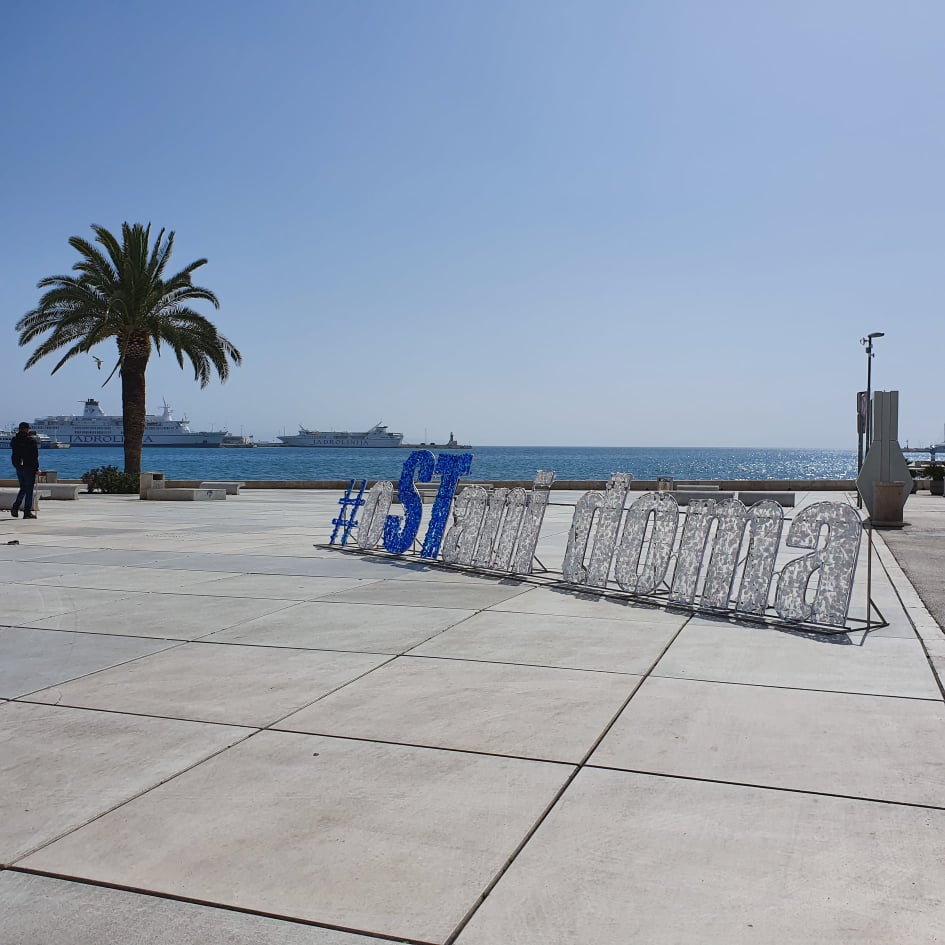
Now compare that to your home country and how they are handling it. What is Croatia doing better/worse?
There is really no comparison possible. I am so sad and mad with the way Romania is dealing with this crisis. The Bucharest government invoked pretty early on the emergency situation and that should have allowed it to take strong measures to restrict movement. But they didn’t, not really. The word to best describe the situation in Romania is chaos.
Medical staff are now resigning in droves in the last couple of days, after getting tired of shouting they do not have adequate equipment or even procedures on how to deal with patients, and rightfully fearing for their and their families’ safety. Medical staff accounts for 20% of the total confirmed cases right now.
As we speak there are 2245 confirmed coronavirus infected persons, and the situation gets worse by the minute. A whole town in Moldova region was just quarantined, after an outbreak at the local hospital. Corruption and incompetence are a daily occurrence in my home country, but now this combination is literally lethal. Combined with the fact that over 200 thousand Romanians have returned home from Italy, Spain or UK from the beginning of this month and many of them did not respect the isolation, I fear Romania is going to follow Italy’s scenario.
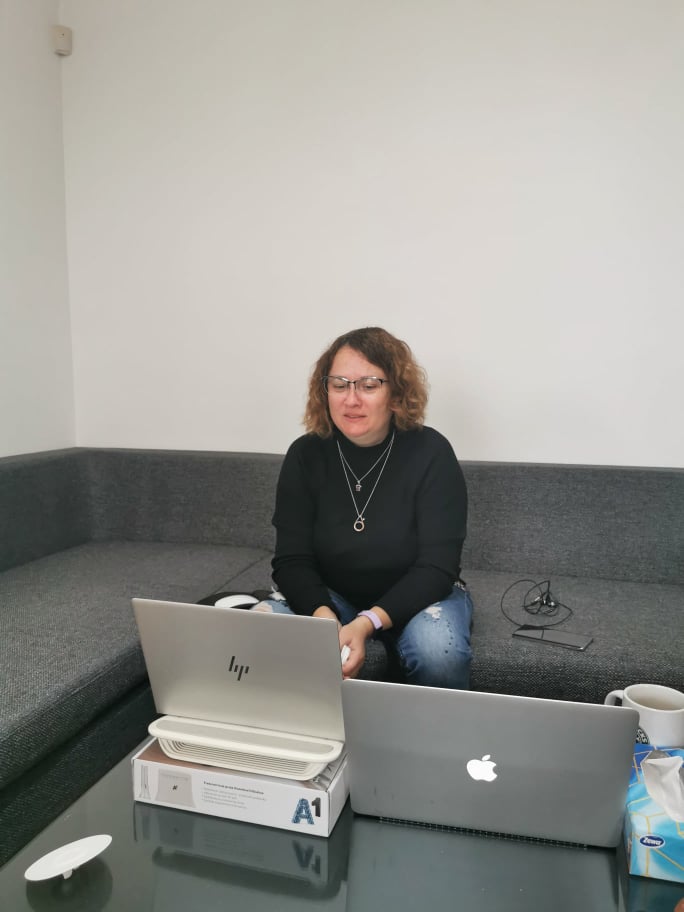
(The realisation of what lay ahead)
What about official communications from the authorities, compared to your home country?
It almost sounds crazy, but I feel so much better informed in a country whose language I still do not speak (TCN has a lot to do with that, as well as Slobodna Dalmacija which I refresh 20 times a day and read with Google Translate).
If someone writes a crisis communication manual after this is over, they will have to give Croatia as the prime example on how this has to be done. As a former journalist and political communications manager, myself, I am beyond impressed. We get all information in a clear manner, twice a day (once a day now), directly from the horse’s mouth, so to speak. The fact that they set up a 113 special coronavirus hotline and a website which now is also partly translated in English, the fact that minister Beros and also Mrs. Markotic do live Q&A sessions on Facebook and the fact the government is sending official info on Viber, that shows they totally understood the need for clear communication and used all tools available in this digital era.
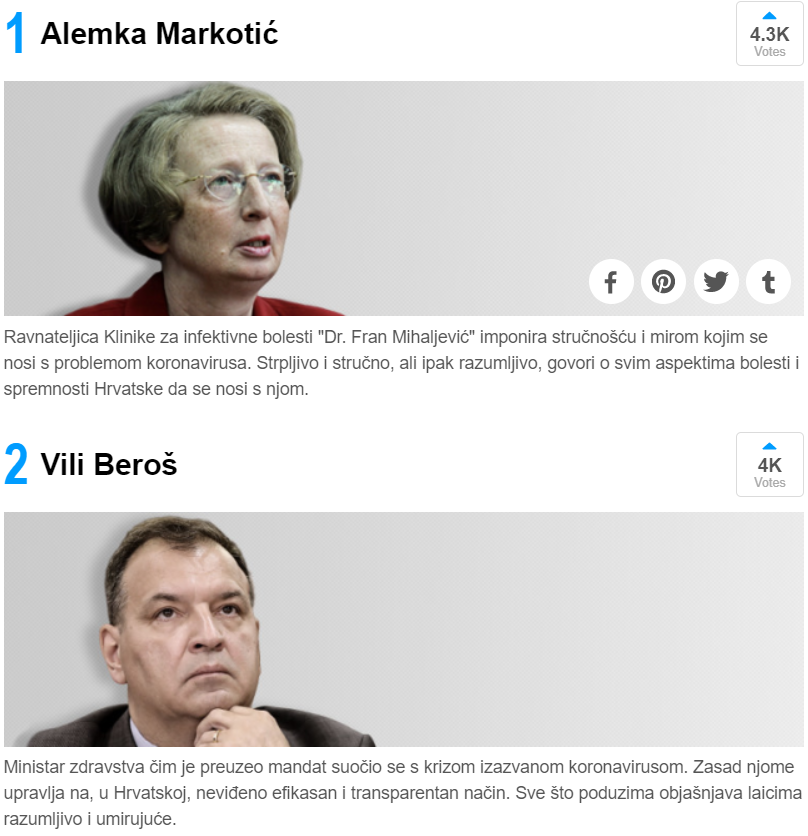
Unfortunately, Romania is at the other end of the spectrum on this, with indecisive action and poor and confusing communication. I will give you just one example, because it affects me personally. My mother is 81 and she lives alone (us three daughters are living all abroad, me in Croatia and my other two sisters in Italy and, respectively, in UK). A week or so ago, the government announced that people over 65 can leave their houses only from 11 am to 1 pm. But a few days later, they added that they can also go out in the evenings if they have dogs they need to walk. And, in case they need to go to the doctor or something else urgent, they can go out at any time during the day. Basically, they pretty much can go out just between 11-13, and also anytime. I would laugh, if it was not actually tragic, since we have a hard time convincing mum to just stay home.
And that is just a small, small example. A week or so ago, they issued an order forbidding local authorities to communicate the local number of cases. They basically decided to stop giving information about the number of cases in each county. The lack of transparency breeds paranoia and lack of trust in authorities, at a time when this is needed more than ever. I am watching from afar, hoping each day they will sober up and start doing the right things, the right way.
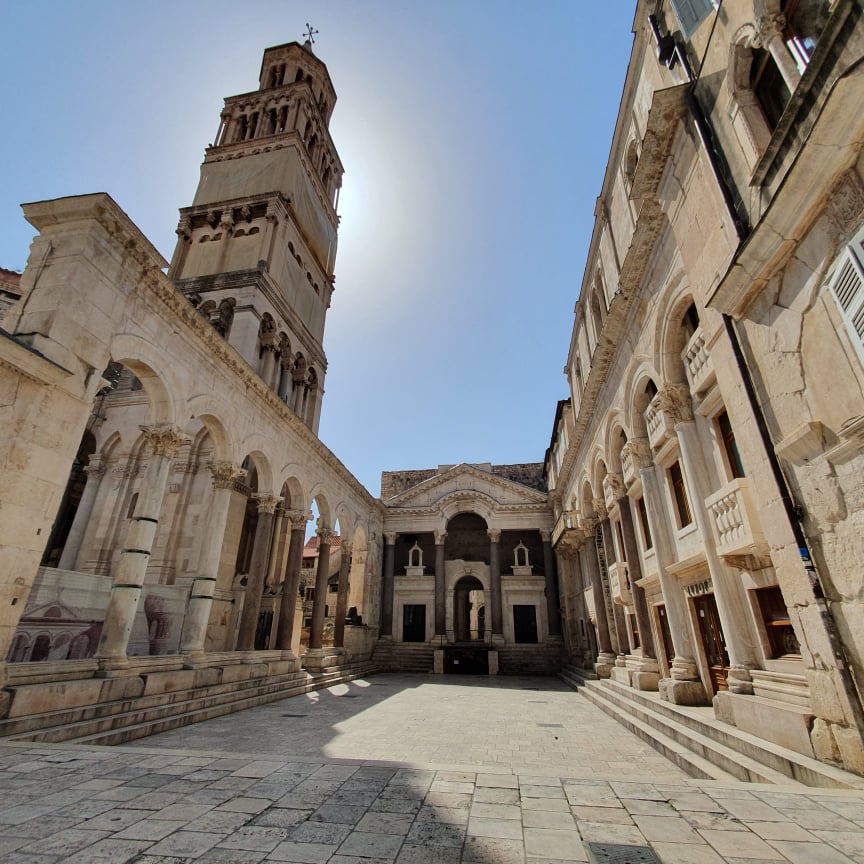
What's the one thing you wish you had taken with you into self-isolation.
My mum.
One thing you have learned about yourself, and one thing you have learned about others during this crisis.
I have learnt that cooking is my crisis/isolation coping mechanism. I usually like to cook when I have time, but since we are at home with basically no work to do, it is the main thing that refills my sanity level back up. We will come out of this with empty pockets, but a few kilos more (although I would have preferred it the other way around).
I cannot say I necessarily learnt new things about others, but I do feel more connected with friends and family, than ever before. The pause we are getting now, forced by the situation, makes us all, I guess, re-evaluate priorities and look at our lives in a new perspective. I cannot imagine our lives being again exactly the same as they were a month ago.
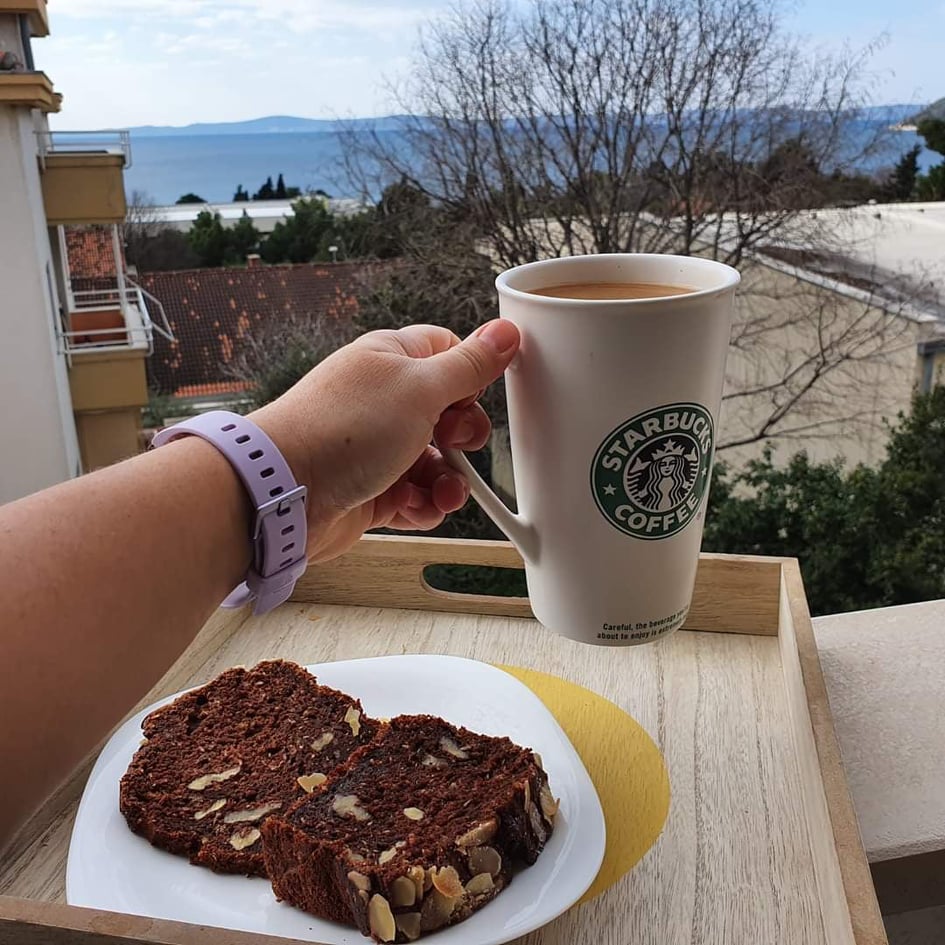
You can learn more about Mirela Rus and her wonderful Breatktime nautical jewellery business in our feature on her in the Foreign Entrepreneurs in Croatia section.
Thanks Mirela, stay safe and see you on the other side.
TCN is starting a new feature series on foreign experiences of sitting out covid-19 here in croatia compared to their home country. If you would like to contribute, the questions are below. Please also include a para about yourself and where you are from, and a link to your website if you would like. Please also send 3-4 photos minumum to This email address is being protected from spambots. You need JavaScript enabled to view it. Subject Corona Foreigner
If you would be interested to record a video version for our partners www.rplus.video please let us know in the email. Thanks and stay safe.
Foreigners Self-Isolating in Croatia: Do You Feel Safer Than in Your Home Country?
Firstly, how are you? Are you alone/with someone? Tell us a little about your situation and sanity levels.
What do you think about the economic measures the government is taking, are they helping your business? (PLEASE IGNORE IF THIS DOES NOT AFFECT YOU)
When did you realise that corona was going to be a big issue?
What is your impression of the way Croatia is dealing with the crisis? How safe do you feel?
Now compare that to your home country and how they are handling it. What is Croatia doing better/worse?
What about official communications from the authorities, compared to your home country?
What's the one thing you wish you had taken with you into self-isolation.
One thing you have learned about yourself, and one thing you have learned about others during this crisis.
TCN has recently become a partner in Robert Tomic Zuber's new R+ video channel, initially telling stories about corona experiences. You can see the first TCN contribution from this morning, my video from Jelsa talking about the realities of running a news portal in the corona era below. If you would like to also submit a video interview, please find Robert's guidelines below
VIDEO RECORDING GUIDE
The video footage should be recorded so that the cell phone is turned horizontally (landscape mode).
There are several rules for television and video news:- length is not a virtue- a picture speaks more than a thousand words
In short, this would mean that your story should not last more than 90 seconds and that everything you say in the report should be shown by video (for example, if you talk about empty streets, we should see those empty streets, etc.).
How to do it with your cell phone?First, use a selfie camera to record yourself telling your story for about a minute and a half. Ideally, it would be taken in the exterior, except in situations where you are reporting on things in the interior (quarantine, hospital, self-isolation, etc.). Also, when shooting, move freely, make sure everything is not static.
After you have recorded your report, you should capture footage that will tell your story with a picture, such as an earlier example with empty streets.
One of the basic rules of TV journalism is that the story is told in the same way as a journalist with his text. Therefore, we ask you for additional effort. Because we work in a very specific situation, sometimes you may not be able to capture footage for each sentence of the report. In this case, record the details on the streets: people walking, the main features of the city where you live, inscriptions on the windows related to the virus, etc.
The same rules apply if you are shooting a story from your apartment, self-isolation, quarantine. We also need you to capture footage that describes your story.
When shooting frames to cover your reports, it is important that you change the angle of the shot (in other words, shoot that empty street from several angles). Also, when shooting a detail, count at least five seconds before removing the camera to another detail.
The material should be about 5 minutes long (90 seconds of your report + frames to cover your story).
After recording everything, send us to Zagreb, preferably via WeTransfer to This email address is being protected from spambots. You need JavaScript enabled to view it.
Pensioners' Associations Call for Allowances to Be Delivered by Post
ZAGREB, March 31, 2020 - A pensioners union and association on Tuesday called for urgent steps so pension allowances can be delivered by post in an effort to protect the elderly and ensure their survival while isolation measures are in force.
We are urgently launching an initiative to introduce the temporary possibility of delivering pension allowances by post based on phone requests. Every day we are receiving requests from pensioners or their relatives warning of the problem of pension allowances being delivered to the majority of pensioners, particularly those who live alone, exclusively in banks, because with the obligatory isolation for the elderly and suspension of public transport they have no way of obtaining their pension allowances, the associations said in a press release.
They have been warning about this problem since 2014 when the possibility of pension allowances delivered by post was abandoned for everyone retired since then.
The pensioners' associations consider this to be an urgent matter so that the survival of the elderly can be ensured without them causing any threats to health.
More coronavirus news can be found in the Lifestyle section.
Dr. Andrija Štampar Clinic Offers "Drive In" Coronavirus Testing Service
The need to get tested for coronavirus if you're feeling unwell or have been around people who have been confirmed to have contracted the illness is of paramount importance in monitoring the number of cases and limiting its spread across the country. Not only is it the morally responsible thing to do, but it's now absolutely necessary.
The need to slow and hopefully half the spread of COVID-19 is essential, and various measures have been set out, and now one Zagreb clinic has introduced a very modern and innovative take on coronavirus testing.
As Poslovni Dnevnik writes on the 31st of March, 2020, the Dr. Andrija Štampar Public Health Institution has introduced ''drive in'' testing and diagnosis of coronavirus this morning in order to speed up the diagnostic process and increase the number of people tested, Vecernji list reports.
''People don't even get out of their cars for this type of testing, which increases the level of safety of the person being tested and that of the health care provider, too,'' they describe from the aforementioned institute and point out that the increased number of tests is the best measure possible for early diagnosis and the prevention of coronavirus infection.
The Institute says that despite the ''drive in'' service now being offered, the ordering for coronavirus testing will continue to be carried out through a selected family doctor.
''Considering the well-being and health of citizens, especially in these extraordinary circumstances, this is just one of the measures taken by the Dr. Andrija Štampar Public Health Institution and the City of Zagreb have taken to further protect citizens,'' a statement on the matter read.
For rolling updates and information in English on coronavirus in Croatia, as well as scientific texts by Croatian scientist Igor Rudan, make sure to stay up to date with our dedicated section.
American Chamber of Commerce in Croatia: 5 Economic Recommendations
As Poslovni Dnevnik writes on the 31st of March, 2020, with the aim of contributing to the economic stability of the Croatian economy, preserving jobs and ensuring the financial liquidity of businesses operating here, AmCham (the American Chamber of Commerce in Croatia) has announced a proposal for additional measures to assist the economy in the wake of the coronavirus epidemic.
"We believe that in this situation, it's necessary to focus the measures on maintaining the liquidity of businesses, maintaining employment and jobs, securing supply chains for businesses, stimulating consumption after the crisis and on tax relief," said Andrea Doko Jelusic, executive director of the American Chamber of Commerce in Croatia, adding that AmCham's measures have been prepared in accordance with the adopted measures of the Government of the Republic of Croatia and in accordance with the good practices of other countries.
To ensure liquidity, the American Chamber of Commerce in Croatia proposes, among other things, the establishment of HBOR government loans and guarantees (worth ~ 10 percent of GDP in line with the experience of other countries); the setting up of funds for industrial sectors which are the most severely affected by the crisis (such as Croatian tourism); the securing of funds for SMEs with impaired liquidity through the approval of credit lines with a two-year repayment obligation and a 0 percent interest rate (modelled on what is being done over in the Czech Republic).
Regarding the proposal for job retention measures, they refer to the introduction of part-time work models; the mandatory use of holidays during the coronavirus crisis; subsidies to workers in the private sector (based on the Austrian and Slovenian models) and through the write-off of income taxes and contributions during the crisis period due to the coronavirus pandemic.
"It's also extremely important to ensure the smooth flow of goods, raw materials and key raw materials needed for the production [capacities] of industries who are currently of strategic importance, as well as exporters, that is, we need to find a way to ensure that strategic enterprises don't end up lacking raw materials, repro materials, etc,'' Doko Jelusic stated, adding that the American Chamber of Commerce in Croatia is already working on an additional proposal for measures that could mitigate the negative effects of coronavirus on the economy and help businesses overcome hardships in the upcoming period.
"Given the current circumstances and the earthquakes that hit Zagreb, the American Chamber of Commerce in Croatia additionally proposes that a provision be made to make deliveries VAT free to hospitals and scientific/educational institutions, which would make it easier for businesses to donate to hospitals and scientific/educational institutions, and contribute to reconstruction and assistance during this crisis period,'' concluded Andrea Doko Jelusic.
AmCham's "Business Assistance Recommendations" are available in Croatian via this link.
MUP's Message to Non-EU Nationals in Croatia Amid Coronavirus Crisis
Coronavirus has wreaked havoc with international travel, and an official answer to the question on the lips of many foreigners, particularly non-EU nationals who have no EU laws to fall back on to allow them to stay in Croatia, has come from MUP.
As Index writes on the 30th of March, 2020, because of the epidemic situation, no measures will be taken against non-EU nationals overstaying their three months of tourist/short stay in the Republic of Croatia under the Aliens Act, the Ministry of the Interior (MUP) said in a statement.
"Due to the current situation caused by the coronavirus outbreak, a certain number of [non-EU] foreigners on a short stay (a stay of up to a maximum of ninety days in a 180 day period) are unable to leave the Republic of Croatia for objective reasons within the period prescribed by the Schengen Borders Code.
In accordance with the recommendations of epidemiologists, we instruct all foreign nationals who find themselves in such a situation to submit their information for the purpose of recording it, primarily by emailing This email address is being protected from spambots. You need JavaScript enabled to view it. or by calling the number on the website of the competent police department (which means the administrative police station responsible for your area of stay), and to avoid possible problems at the border crossing point when leaving the Republic of Croatia.
Please do not come to the police stations or administrations personally, but do so only when called upon by an official when speaking with them on the telephone.
Because of the above [situation], no measures will be taken against such foreigners [who are overstaying their ninety days of short/tourist stay] as prescribed by the Aliens Act,'' the Ministry of the Interior's statement said.
A note from TCN: This means you do not need to engage a lawyer, and you do not require any sort of legal assistance.
Make sure to follow our dedicated section for all you need to know about coronavirus in Croatia.
Judge: Croatia's Coronavirus Response Violates Constitution
March 31, 2020 — The Croatian government’s response to the coronavirus outbreak includes several violations of constitutional rights, according to Judge Andrej Abramović, who sits on the nation’s top court, according to Jutarnji List.
The judge claims the National Crisis Directorate did not have the legal right to limit citizens’ movement, forcing them to stay place in their legal residences. The Law on the Civil Protection System, as well as its amendment adopted by Parliament on March 18, did not give such authority to the National Directorate, he argues.
Abramović presented his arguments in “Constitutionality in the Age of Virus,” on iusinfo.hr.
Measures to combat the spread of coronaviruses are necessary but should deployed using existing procedures and laws in the Croatian constitution, the judge writes. An amendment to the Civil Protection System Act cannot delegate to the Civil Protection Directorate the powers of all government bodies because it means the suspension of democracy, the de facto dictatorship.
Abramović argues that the purpose of his text is not to polemicize the measures that are being taken but "to warn who is taking them,” arguing bypassing the constitution could cost “those values that are even more important than human lives in a democratic society."
Abramovic, in the published text, also argues against the way the island of Muter was put into quarantine. The decision was made on March 25 by the Civil Protection Staff of Šibenik-Knin County.
"Physical barriers were put on the access roads. Like during the war,” the judge writes, warning that the decision is illegal on several levels.
According to the Law on the Protection of the People from Infectious Diseases, quarantine, according to the judge, can only be forcibly accommodated individuals, not entire areas. In addition, the quarantine can be determined only by the Minister of Health. Also, those forcibly placed in quarantine are due compensation, he adds.
"None of the above," Abramović points out, "is the case here. If necessary, [the measures] must first be provided for by law and then introduced in the manner prescribed by law. This is how residents are at the mercy of activism of some kind of directorate."
The Constitutional Court judge also discusses the way in which the authorities determine the measure of self-isolation defined by the Law on Infectious Diseases Treatment as "isolation and treatment in the apartment".
It is quite questionable to the judge whether one's constitutional rights can be restricted when it is beyond doubt that there is a test that confirms or denies infection.
"Detaining people in their own homes without testing puts them in a precarious position: neither healthy nor sick, they are stigmatized to the extent of being threatened by most."
By problematizing the way in which the concrete measures were enacted, Abramović seeks to draw attention to the essential constitutional issues raised by the COVID-19 pandemic and the measures taken by the authorities to suppress it.
In his article, he raises doubts that the ruling majority in Parliament deliberately avoids applying constitutional and legal norms, in order to allow itself to manage the crisis by means of laws passed by a simple instead of a two-thirds majority.
He analyzes the maneuver that the governing have resorted to in order to avoid the automatic activation of Article 17 of the Constitution relating to emergency situations, whose activation of all decisions affecting constitutional human rights would have to be approved by the Parliament by a two-thirds majority, as long as that legislative body can meet.
Abramovic clarifies the amendments to the Civil Protection System Act that was passed by Parliament on March 18, introducing the concept of "occurrence of special circumstances" even though the description of "special circumstances" is identical in substance to the state of "catastrophe" that the law already contains. "Why did the government not declare the disaster foreseen by law?”
Abramovic suspects that by this maneuver, the government sought to avoid the obligation to seek a two-thirds endorsement of the parliament for measures that encroach on constitutional human rights.
Abramović also chastised his fellow constitutional judges. “The Constitutional Court systematically, using lack of an explicit constitutional norm, refuses to participate in interpreting the Constitution in the a time of crisis, insists on deciding post-festum, when the eventual determination of the disproportionality of the measures taken will no longer mean anything to anyone."
The judge says that as a layman he does not know, nor does he dare to predict, what the consequences of such treatment will be to combat the pandemic. But the consequences will be bad in relation to guaranteed human rights - he is quite sure of that.
"There is no such necessity that justifies acting beyond the laws and the Constitution because both the Constitution and the laws regulate the state of emergency,” he wrote. “In the long run, the damage to democracy is greater than the damage caused by any virus. "
There is no doubt for this constitutional judge that Croatia is in a state of emergency as defined in Article 17 of the Constitution. "Where will you find a greater state of emergency than the global pandemic, the cessation of human and commodity circulation, quarantine and isolation of all kinds and every step of the way?”
Abramovic points out that it is frighteningly widespread that Parliament is no longer acting in the event of a state of emergency. "This is a wrong assumption,” he explains. Article 1 of the constitution states that it does not act only if it cannot meet. "Such a false perspective that the Parliament is not functioning in a state of emergency offers the wrong answer: if the legislature is no longer Parliament, then it will be someone else, possibly also a body that manages the crisis on behalf of the Government. And then it is a coup.”
Croatia Importing 250 Ventilators
ZAGREB, March 31, 2020 - Twenty-seven COVID-19 patients are currently on ventilators, Croatia has 803 ventilators and 250 new ones will be imported gradually, Health Minister Vili Beroš said on Monday.
There are offers of ventilators from the East but the machines must be inspected first, he said at a press conference of the national civil protection authority.
"Our fate is in our hands. The number of patients can be lower by the day. It's all up to us, to me, to us all," Beroš said.
Persons ordered to self-isolate must notify sanitary inspectors or epidemiologists when self-isolation measures end.
The terms under which a patient can be discharged from hospital to isolate at home are being reviewed, said Alemka Markotić, head of Zagreb's Fran Mihaljević Infectious Diseases Hospital.
Initially, more patients were young or middle aged and they recovered more quickly, she said, adding that those infected "are positive for coronavirus about 24 days and they will be under supervision 28 days because they aren't expected to be positive after that period."
More coronavirus news can be found in the Lifestyle section.
United Group Donates Protective Gear Worth $500,000 to Croatia
ZAGREB, March 31, 2020 - United Group, which includes several telecom and media companies operating in Croatia, decided to donate 5,600 COVID-19 test kits, 150,000 protective masks, 4,000 protective glasses, seven ventilators and other protective gear worth a half million dollars, the N1 broadcaster said on Monday.
United Group, a multi-play telecom and media provider in Southeast Europe, will donate $3 million worth of protective gear to the seven countries in the region in which it does business: Slovenia, Croatia, Bosnia and Herzegovina, Serbia, Montenegro, North Macedonia and Bulgaria.
The delivery of the donations starts this week. The donated protective gear and medical equipment was paid on 15 March.
The companies within this group that operate in Croatia are Tele2 Croatia, and United Media with channels: Nova, Doma, N1, Sport Klub, Fight Ch, Grand, Pikaboo, Vavoom, Mini, Lov i ribolov and IDJ.
More coronavirus news can be found in the Lifestyle section.
Making Science Sexy: Igor Rudan's Incredible Video Series: Survival, the Story of Global Health
March 31, 2020 - Eminent Croatian scientist Igor Rudan has written some of the most authoritative and clear texts on COVID-19. Now watch him explain Survival, the Story of Global Health. Science IS sexy.
I wrote an article a couple of days ago in which I said that I was not in the habit of writing an article praising people I had never met, which is true.
And yet, here I go again... Maybe it is the cabin fever starting to show.
Croatia has many heroes at the moment, from the dedicated health workers on the corona frontline to those in power with the huge responsibility to keep Croatia safe and navigate the most unpredictable waters that the world has known in my lifetime.
And these heroes and heroines are more than rising to the task, and I think them sincerely on behalf of me and my family (and, I suspect, the rest of the country). We have already written about new Health Minister Vii Beros and the legendica that is Almenka Markotic.
And so we come to our third hero of the hour, whom I have also never met. Indeed - please don't tell him, as I am a little embarrassed to admit it - I had no idea who he was until my colleague Lauren starting translating and publishing his amazing texts about corona on TCN.
(Just like Alemka and Vili, Igor Rudan also makes the list of the current top 10 most positive people in Croatia)
And when I read the articles on corona by Igor Rudan, I felt even more embarrassed. They were the most detailed, clear and factual articles I have read since this madness began. His latest answers one of the questions that maybe people are asking, but nobody seems to know the answer to - but Igor does.
Igor Rudan Explains What Went So Wrong With COVID-19 in Italy
You can read more of Lauren's translations of Igor's corona masterpieces here.
I decided to seek him out for a TCN interview and was surprised to find that we were friends on Facebook. I have currently 3,546 FB friends, and I know about 200 of them, but many Croatians seem to like to connect with a fat Irishman living in and writing about their country, which is great.
As we were friends on FB, that made the communication easier, so I sent him a link to one of Lauren's translations and said we would be happy to do more, so that his wisdom could go beyond the confines of the svjetski jezik, hrvatski, and into English.
Not only did Igor agree, but he was happy to add his superstar name to the TCN team of writers, thereby tripling the TCN IQ in one fell swoop, insisting that the texts appear in English first on TCN, and then he hired Lauren to translate lots of his other work.
It is a marriage made in heaven, and I have not seen young Simmonds as enthused about translating since we first met 4 years ago.
An extremely funny man from our messaging exchanges, he is the person I am most looking forward to meeting after all this madness is over (as well as holding Mate Rimac to his promise to let me drive him around in his $2.75 million C2 electric wonder car - I have promised to drive slower than Richard Hammond).
And then THIS!
My wonderful wife sent me a link to a YouTube video yesterday - Igor Rudan presenting Survival, the Story of Global Health.
It is sensational! Beautifully filmed, calmly and intelligently presented by Igor himself, mostly shot in Croatia, as well as Edinburgh, where he is a Prof at the university.
We called the kids to watch it together as a family. Watching their initial lack of enthusiasm turn to fascination during the first episode was a joy.
For those of you watching reruns of NCIS and Law and Order, THIS is for you. Check out the full series below.
And the final bit of reassuring news for this article. Igor messaged us last night to apologise for a short delay in sending us an article update. He explained that he had spent most of the day advising the Croatian authorities on the response to corona.
Doesn't it make you feel just a little safer knowing that those tasked with keeping us safe are taking advice from the very best?

